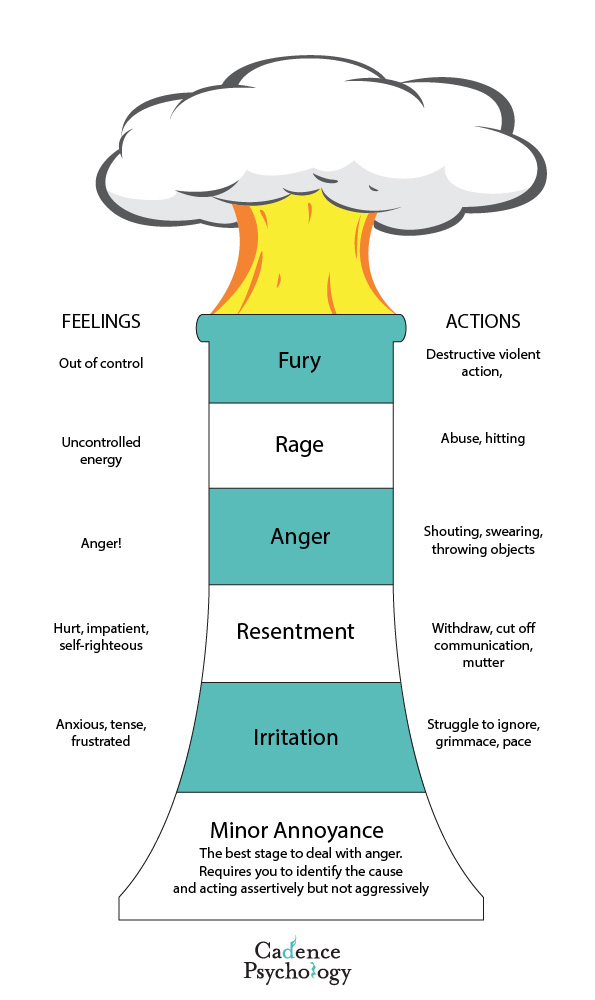Anger Management Treatment In Sydney
What Is Anger
Anger is an emotion that you may have in response to any situation that seems unfair or unjust. This is a completely normal healthy human emotion, which can often be of assistance. Anger can vary in intensity from mild irritation to complete rage depending on you and the situation.
Why Do I Get Angry?
There are a few different causes of anger, but at its core, anger is an important evolutionary process to help protect us from harm. You have probably noticed yourself becoming angry when a situation is frustrating. When things don’t go the way you want, it’s natural to feel upset, hurt, frightened or disappointed. Sometime in order to feel more empowered we move from these emotions to anger. This puts us in a frame of mind that is eager to right the wrongs we believe have happened.
What Are the Symptoms Of Anger?
Once you encounter a frustrating or unfair situation your body triggers a series of physiological events to prep you for action. We happen to call this combination of bodily symptoms “anger”. Be on the look out for:
- Pounding heart
- Tight jaw
- Sweating
- Tight chest
- Shaking
- Heavy breathing
- Clench fists
- Feel hot
- Headaches
What Are Common Behavioural Responses To Anger
The emotion of anger itself is never a problem, but sometimes the way you choose to respond to it can cause you issues. Imagine if you were sitting at a nice Sydney cafe and your order comes out but looks horrible. You would most likely feel angry about the situation, but you could choose to either request calmly that the problem be fixed or explode at the waiter.
Some common behaviours that follow when we get angry include:
- Mind going blank
- Insulting others
- Throwing things
- Staring at others aggressively
- Screaming/raising your voice
- Punch walls
- Being argumentative
- Being aggressive
- Pacing
- Shutting down
- Ruminating about the problem
Is Anger A Bad Thing?
In a word, no. Anger is a normal human emotion and if someone is treating you unfairly it can provide the energy you need to balance the scales. The most important factor is how you choose to react to anger. If some of the reactions listed below seem familiar to you, then it might be a sign that anger has become a problem rather than a tool to help you resolve issues:
- Anger involves verbal, emotional, physical or psychological abuse.
- You feel angry a lot of the time.
- People close to you are worried about your anger.
- Anger is leading to problems with personal relationships and work.
- You think you have to get angry to get what you want.
- Anger seems to get bigger than the event that set it off.
- Anger lasts for a long time, and well after the triggering event has passed.
- Anger affects other situations not related to the original event.
- You are becoming anxious or depressed about your anger.
- You are using alcohol or other drugs to try to manage your anger.
- You are getting angry with the people who are closest to you, or with people who are less powerful than you, rather than dealing with the situation that sparked off your anger in the first place.
Levels Of Anger
Like any emotion in your body, anger exists on a continuum. It’s rare that you go straight to explosive anger. The diagram below looks at the various levels of anger you might experience as you go about your life in Sydney.

As the diagram shows, there are a lot of steps between being slightly annoyed and full of rage. Learning how to manage your anger means learning to deal with your anger as quickly as possible. The more you allow it to build, the more difficult it is to rein in, and the greater the likelihood of behaving in a way that you might later regret.
Anger Management Strategies To Get You Started In Sydney
Relaxation
When feeling overwhelmed by anger, your nervous system is normally on high alert. Relaxation can be a great way to bring down your physical arousal level so that you can start to manage your anger again rather than have it control you.
There are a variety of ways to practice relaxation for anger. Have a go at some of the following:
Deep breathing – Try breathing in for 2-seconds, holding your breath, then breathing out for 2-seconds. Repeat this for 10 whole breaths and start to calm your nervous system.
Progressive Muscle Relaxation – Work your way up from your feet to your head, progressively tightening and then loosening each group of muscles e.g. your calves, then your tights, then your buttocks.
Self care – Take the time to look after yourself. Go for a walk around the North Sydney harbourside, take in an early Yoga class. Doing these little things every day will give you more resilience when anger builds
Grounding Exercises
Ground exercises are about short-circuiting your anger as it starts to feel like it’s growing out of control. There are a tonne of different exercises about, but here are a few we recommend:
Naming categories – Look around the room and name different categories of items, for example all the different colours, shapes, textures, and common items you can see.
Five senses – Try to notice something with each of your five senses: sight, sound, smell, taste, touch.
Connect with the chair – Whilst sitting in a chair, become aware of the chair: your weight being supported by the chair, the places where your body makes contact with the chair.
Our Top 10 Tips For Managing Anger In Sydney
- Relax
- Exercise
- Distract yourself
- Time outs
- Assertiveness skills
- Make time for self care
- Counting
- Leave the situation
- Practice grounding techniques
- Learn mindfulness

Summary
Anger is a powerful emotion, but it is not your enemy. The key is learning the skills to manage your level of anger so that it can inform, rather than control you. This isn’t always easy to do on your own which is where a Clinical Psychologist can help.
There are a range of treatments out there to help with managing anxiety. Don’t be afraid to ask your Clinical Psychologist or Doctor about the options that are available so that you can find the approach that best suits you.
Start Treating Your Anger With Cadence Psychology In North Sydney
If you’re interested in getting treatment for anger in Sydney then we’d love to hear from you. Cadence Psychology provides sessions with Medicare rebates meaning you can start getting help without breaking the bank.
Contact us today to schedule an intake call and see how we can best help you. You can call us on 0478 876 678 or leave us a message using the contact form below.
Don’t forget to check out our other toolbox guides as well to help you on your way towards living the life you want to live.
